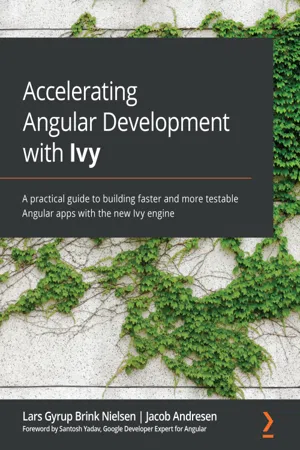
Accelerating Angular Development with Ivy
- 242 pages
- English
- ePUB (mobile friendly)
- Available on iOS & Android
Accelerating Angular Development with Ivy
About this book
Get a comprehensive introduction to the major Angular framework rewrite known as Angular IvyKey Features• Upgrade your Angular applications from traditional View Engine to modern Angular Ivy• Get a detailed walkthrough of the new features and breaking changes in Angular• Explorer new Angular APIs, syntax, tooling, and configurations for modern frontend web developmentBook DescriptionAngular Ivy is the latest rendering engine and compiler introduced in Angular. Ivy helps frontend developers to make their Angular applications faster, better optimized, and more robust. This easy-to-follow guide will help you get to grips with the new features of Angular Ivy and show you how to migrate your Angular apps from View Engine to Ivy. You'll begin by learning about the most popular features of Angular Ivy with the help of simple stand-alone examples and realize its capabilities by working on a real-world application project. You'll then discover strategies to improve your developer workflow through new debugging APIs, testing APIs, and configurations that support higher code quality and productive development features. Throughout the book, you'll explore essential components of Angular, such as Angular Component Dev Kit (CDK), Ahead-of-time (AOT) compilation, and Angular command line interface (CLI). Finally, you'll gain a clear understanding of these components along with Angular Ivy which will help you update your Angular applications with modern features. By the end of this Angular Ivy book, you will learn about the core features of Angular Ivy, discover how to migrate your Angular View Engine application, and find out how to set up a high-quality Angular Ivy project.What you will learn• Find out why Angular Ivy tests are faster and more robust• Explore the concept of CSS custom properties and scoping of values and learn how to use them with Angular Ivy• Use testing harnesses present in Angular components to write effective tests• Explore the architecture of the Angular compatibility compiler and understand why it is important• Discover effective techniques for migrating your existing Angular apps to the Ivy engine• Overcome challenges that you might face when switching to AOT compilationWho this book is forThis book is for experienced Angular web developers who want to migrate to the latest Ivy engine for building faster web applications. Intermediate knowledge of Angular and TypeScript will help you get the most out of this book.
Tools to learn more effectively

Saving Books

Keyword Search

Annotating Text

Listen to it instead
Information
Chapter 1: Discovering New APIs and Language Syntax
- The optional chaining operator (?.)
- The nullish coalescing operator (??)
- Native private class members (#)
- Modernizing your code with powerful language features
- Optimizing regional support with improved globalization APIs
- Enhancing tests with stronger types and new APIs
Technical requirements
- Angular Ivy version 9.1
- TypeScript version 3.8
Modernizing your code with powerful language features
The optional chaining operator
Table of contents
- Accelerating Angular Development with Ivy
- Foreword
- Contributors
- About the authors
- About the reviewer
- Preface
- Chapter 1: Discovering New APIs and Language Syntax
- Chapter 2: Boosting Developer Productivity Through Tooling, Configuration, and Convenience
- Chapter 3: Introducing CSS Custom Properties and New Provider Scopes
- Chapter 4: Exploring Angular Components Features
- Chapter 5: Using CSS Custom Properties
- Chapter 6: Using Angular Components
- Chapter 7: Component Harnesses
- Chapter 8: Additional Provider Scopes
- Chapter 9: Debugging with the New Ivy Runtime APIs
- Chapter 10: Using the Angular Compatibility Compiler
- Chapter 11: Migrating Your Angular Application from View Engine to Ivy
- Chapter 12: Embracing Ahead-of-Time Compilation
- Other Books You May Enjoy
Frequently asked questions
- Essential is ideal for learners and professionals who enjoy exploring a wide range of subjects. Access the Essential Library with 800,000+ trusted titles and best-sellers across business, personal growth, and the humanities. Includes unlimited reading time and Standard Read Aloud voice.
- Complete: Perfect for advanced learners and researchers needing full, unrestricted access. Unlock 1.4M+ books across hundreds of subjects, including academic and specialized titles. The Complete Plan also includes advanced features like Premium Read Aloud and Research Assistant.
Please note we cannot support devices running on iOS 13 and Android 7 or earlier. Learn more about using the app